[最も選択された] と思います grammar 172196
Essentially 「〜て頂ければと思います」 is just one of the longer phrases here or something similar, except that the middle part has been left out Leaving out parts of sentences is common above is Japanese いかがですか grammar ikagadesuka if you don't understand the signs we used in fomation, you can find their meaning here signs used in Japanese grammar structures You can search the structure you want by using the search tool on our website (using key grammar 'structure name' or you can find more JapaneseTo feel ~ This can also be used with pasttense 「思いをした」 (omoi o shita) Click the image to download the flashcard Access ALL extra downloads, ebooks, and study guides by supporting JLPT Sensei on Patreon
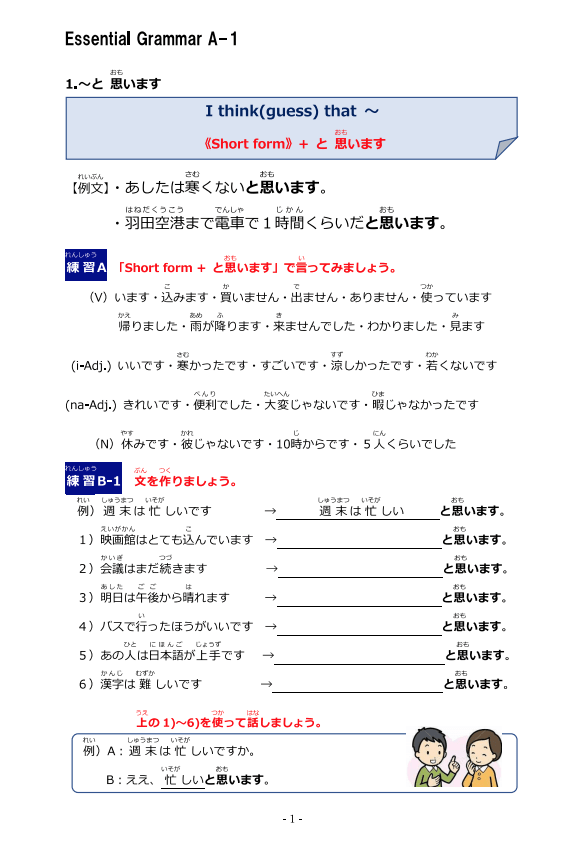
Essential Grammar And Conversation A B 047 Saturday 13 10 15 00 Pm Jst Coto Courses
と思います grammar
と思います grammar-例文帳に追加 I would be very grateful if you would help me Tanaka Corpus もっと詳細が知りたければ、私の告白を読んで いただければと思います 。 例文帳に追加 and if you care to hear more, turn to the confession of Robert Louis Stevenson『ジキルとハイド』 これは、私の個人的なThe nonpast tense 思います(思う) is and action that is done in the present or future In this case having a thought or holding an opinion The present continuous tense 思っています(思っている) is an ongoing action
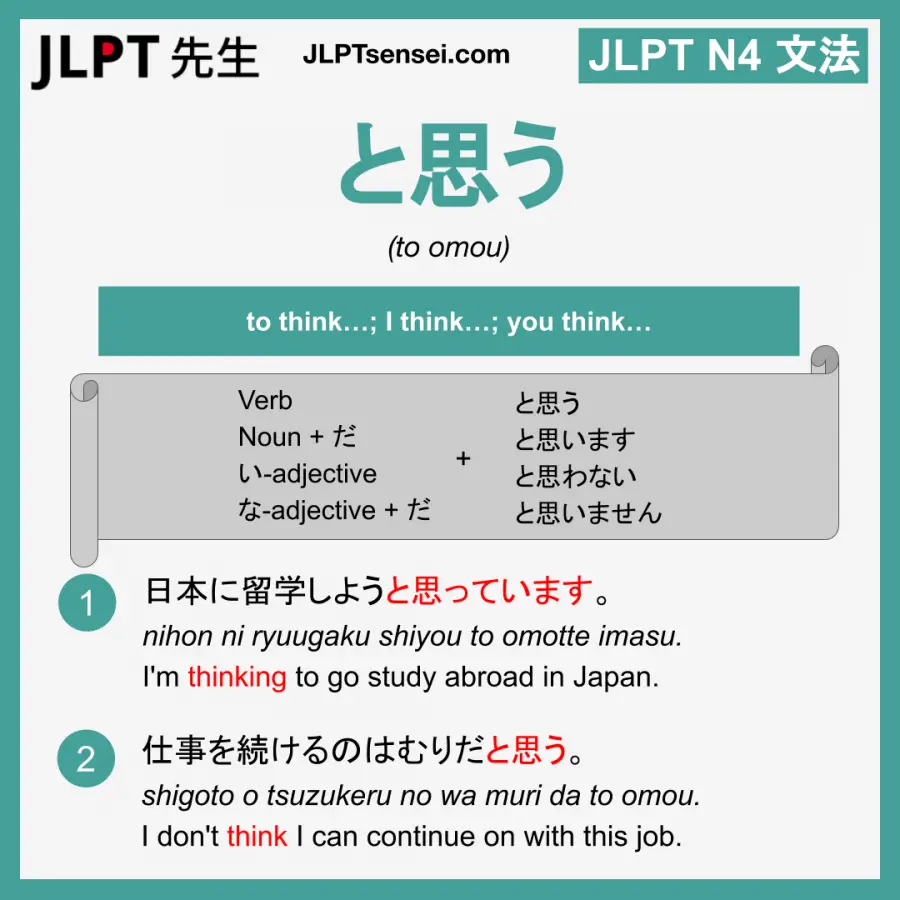



Jlpt N4 Grammar と思う To Omou Meaning Jlptsensei Com
と思いきや (to omoikiya) Meaning I thought; ・今年はjlptを受け ようと思います。 ・先生、毎日この本を使って日本語を勉強し ようと思っている んですが、いかがでしょうか。 ・将来は医者にな ろうと思っています 。ジョンさんは? ・母の日には何かプレゼントをあげ ようと思っています 。 難しいと思います (むずかしい と おもい ます), 難しいだと思います (むずかしい だ と おもい ます) 難しいと思います の類義語 The former is correct難しいと思います is correct 難しい is an adjective ( i adjective) An adjective verb (形容動詞 keiyou dousi in Japanese) is called 'na adjective' Attaching な or だ to
今回の文法は「ようとする」です! 普段からよく使われる文法ですよね。「よう」を使う文法はたくさんあります。 ですから。学習者なかなかうまく使えないんですよね。 今回は「ようとする」これは3つの用法があります。「直前」「試み」「意思がないこと」の3つです。Verb (casual form) (か)と思いきや Noun (だ) なadjective (だ) いadjective い Learn Japanese grammar かと思いきや かとおもいきや (ka to omoikiya) Meaning contrary to expectations; Your second option (どう思います?)is correct You should only use the particle と in a case like this to indicate an exact thought, or quote For example, if you say どうと思います?、what you are really asking is, "Do you think "どう"?
Learn about 〜と思いきや〜 on Kanshudo the fastest and most enjoyable way to learn Japanese grammarCheck out my channels!https//nihongolessonscom/https//wwwpatreoncom/akokitamurahttps//twittercom/akokitamurahttps//anchorfm/akokitamurahttps//wwwiSupport SushiChan on Patreon and you will get SushiChan original goods and a private lessonhttps//wwwpatreoncom/sushichanjapaneseschoolHello こんにちは
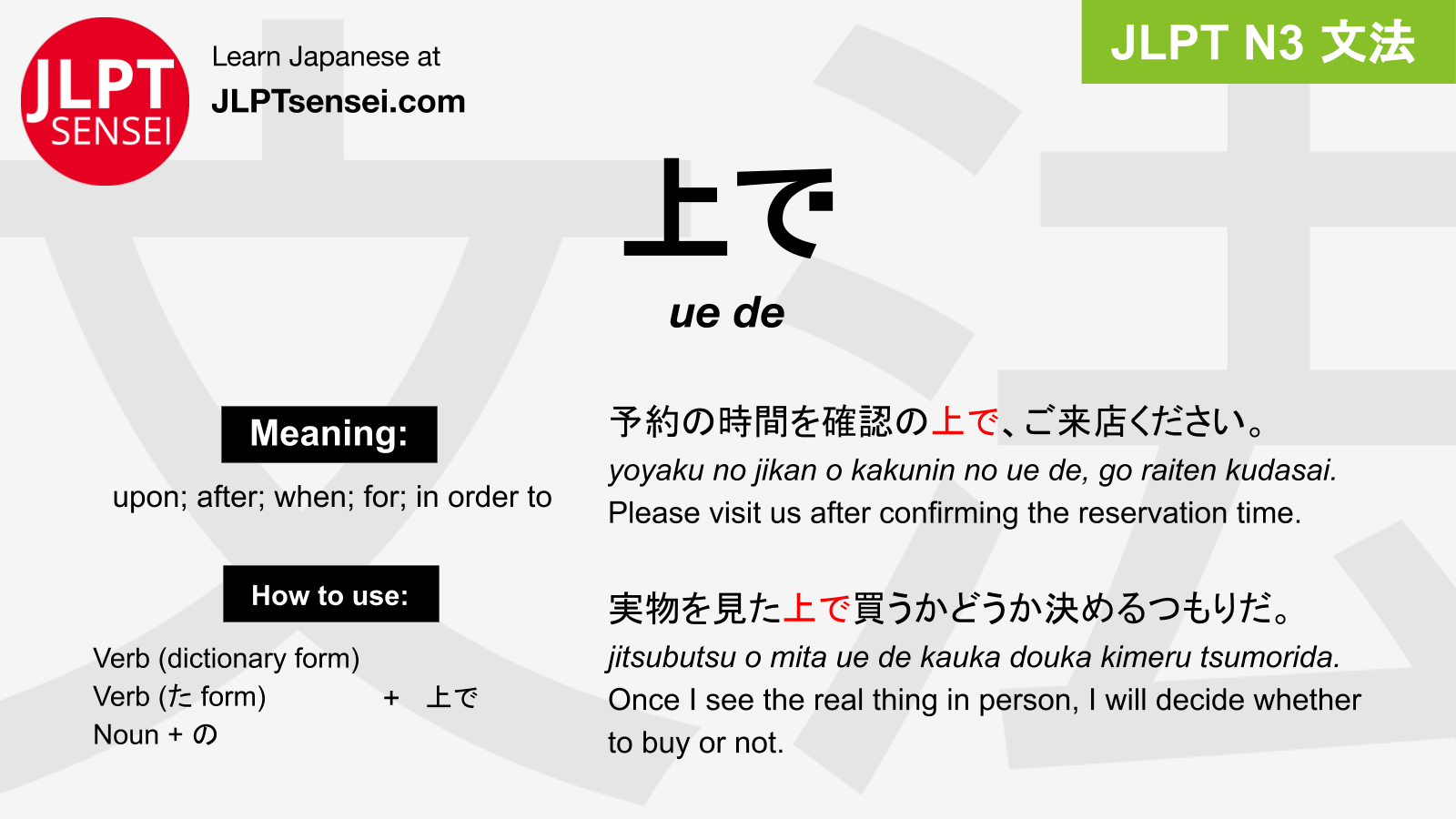



Jlpt N3 Grammar 上で Ue De Meaning Jlptsensei Com




Learn Japanese Japanesepod101 Com How To Say Business In Your Language Ps Sign Up Here To Learn More About Japanese Grammar Culture Pronunciation Slang Language Learning Tips And Much
To think How to use the Phrase 1 と思いきや Phrase 2 Explain Often used with opposite results to what was expected, thought so but unexpectedly Example sentences 1, 今年の夏は猛暑が続くと思いきや、連日の雨で冷害の心配さOr so we thought, but ~ Click the image to download the flashcard Access ALL extra downloads, ebooks, and study guides 用法① 同時接続ます形+つつ v:し+つつ a:なし na:なし n:なし意味・使い方1.2つの動作が同時に行われることを表す2.非常に硬く、使用場面は限られるので、いくつかよく使う動詞をあげ、慣用的に教えた方がいい比較文型:「




N5 Japanese Grammar と思います I Think Lesson98 日本語 Jlptn5 Youtube
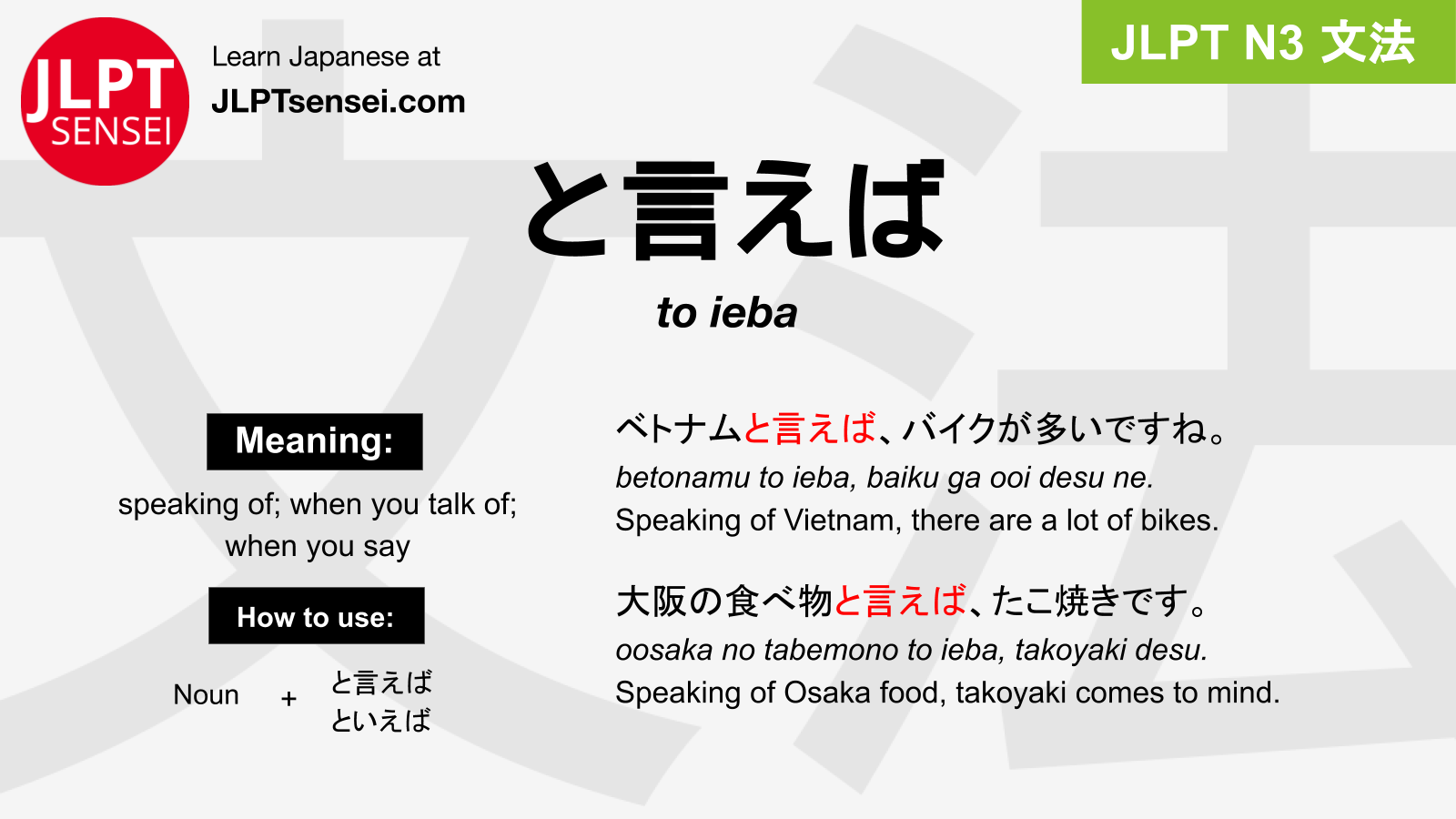



N3 Grammar と言えば To Ieba Learn Japanese Jlpt Sensei
Let's learn Japanese たいとおもう grammar taitoomou Japanese たいとおもう grammar taitoomou Formation Vます(ます)+たいとおもう Meaning and how to use Describing the speaker's wishes and aspirations This is a softer, more polite way of saying 「~たいJLPT N5 Grammar と思います (to omoimasu) と思います (to omoimasu) Meaning I think Explain We use the auxiliary「と」 to denote the content of 「おもいます」 Used to indicate speculation When judging and thinking about something that is negative, the previous part of 「と」 will be negative Used to express ideas最低限度 1 意志形單獨使用的時候表現出的是自言自語或者勸誘的意思。 說話者想要對聽者表達自己有進行某行為的意志時,一般會在意志形後接上「と思います」(普通形「と思う」)。 (1)あしたは早く起きようと思います。 (明天我想要早起。 ) 2 意志如果持續一段時間的話則用「と思っています」。 (2)夏休みに旅行しようと思っています。 (暑假我想去旅行。




Jlpt N3 Grammar といい たらいい To Ii Tara Ii Meaning Jlptsensei Com




Essential Grammar And Conversation A B 047 Saturday 13 10 15 00 Pm Jst Coto Courses
「〜と思います。」/「〜と思う。」 ※「 のでは (ないか)」と「 んじゃ (ないか)」とでは、「んじゃないか」の方がより話しことば 的 (てき) な表現になる 敬体 (けいたい) 常体 (じょうたい) 〜方がいいと思います。 〜方がいいと思う。 〜方がいいと思いますけど。 もらう (uverb) – to receive 「あげく」 is a grammar used to describe a result, usually negative, that came about after a great deal of effort The rule for this grammar is very simple You modify the verb or noun that was carried out with 「あげく」 and then describe the final result that came about from that verb or noun今 話題 (わだい) の映画はとても 怖 (こわ) いホラー映画らしいので あなた 向きだ と思います。 あの 食堂 (しょくどう) では安くて量が多いから 男子学生 向きです 。 このお弁当は お 年寄 (としよ) り 向きの 味 ですね。
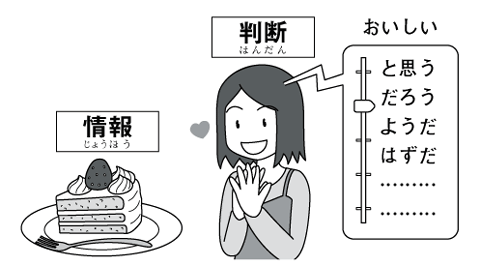



国際交流基金 日本語教育通信 文法を楽しく そうだ ようだ らしい 2




とおもう To Omou Japanese Quizzes
英文添削でも大活躍! ウェブブラウザでの英文チェックを自動的にしてくれる"Grammarly"と紹介しましたが、無料会員登録後に、"Grammarly"にアクセスすると通常の英文チェックをすることが出来ます。 機能としては、英文を書き込むと下の画像のように、自動で英文チェックをしてくれます。 ここでも、単語のスペル・英文法チェック・単語のチョイスの提案をと言います(to iimasu) Meaning say, tell, speak Explain We use the auxiliary「と」 to indicate the content of 「い い ま す」 When I quote directly, I leave that quote alone and put it inside in 「」 When quoted indirectly, we use the ordinary form in front of 「と」 The duration of the quoted quote does notCLICK HERE→ http//wwwpunipunijapancom/toomoimasu/Click the link above to go to today's video review!
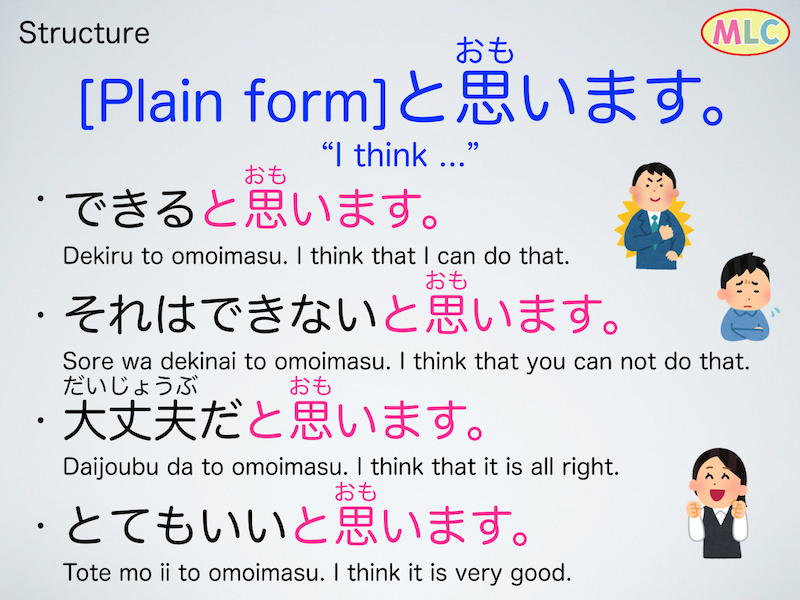



Mlc Japanese School Structures Japanese Language Jlpt Nihongo にほんご 日本語 Grammar




Nihongo Eな Portal For Learning Japanese
Quickly study kanji, kana, words or grammar or test your current knowledge Drawing Practice Practice drawing hiragana, katakana, kanji components and kanji Beginner Lessons Lessons for absolute beginners Zero to 100 kanji, plus grammar & vocab 何をやっているのかと思いきや、じ~っとアリの巣を見つめていた。 英語は理解のためのヒントです。 ① I thought my homework was over, but there was still a problem on the back of the worksheet ② I made it! Explanation for the Usages of たい, 欲しい, and て欲しい In English, you have a useful word "to want" By using that, you can express three types of desire, eg "I want a textbook," "I want to study," and "I want you to study" In



浦島太郎 Japanese Book Review
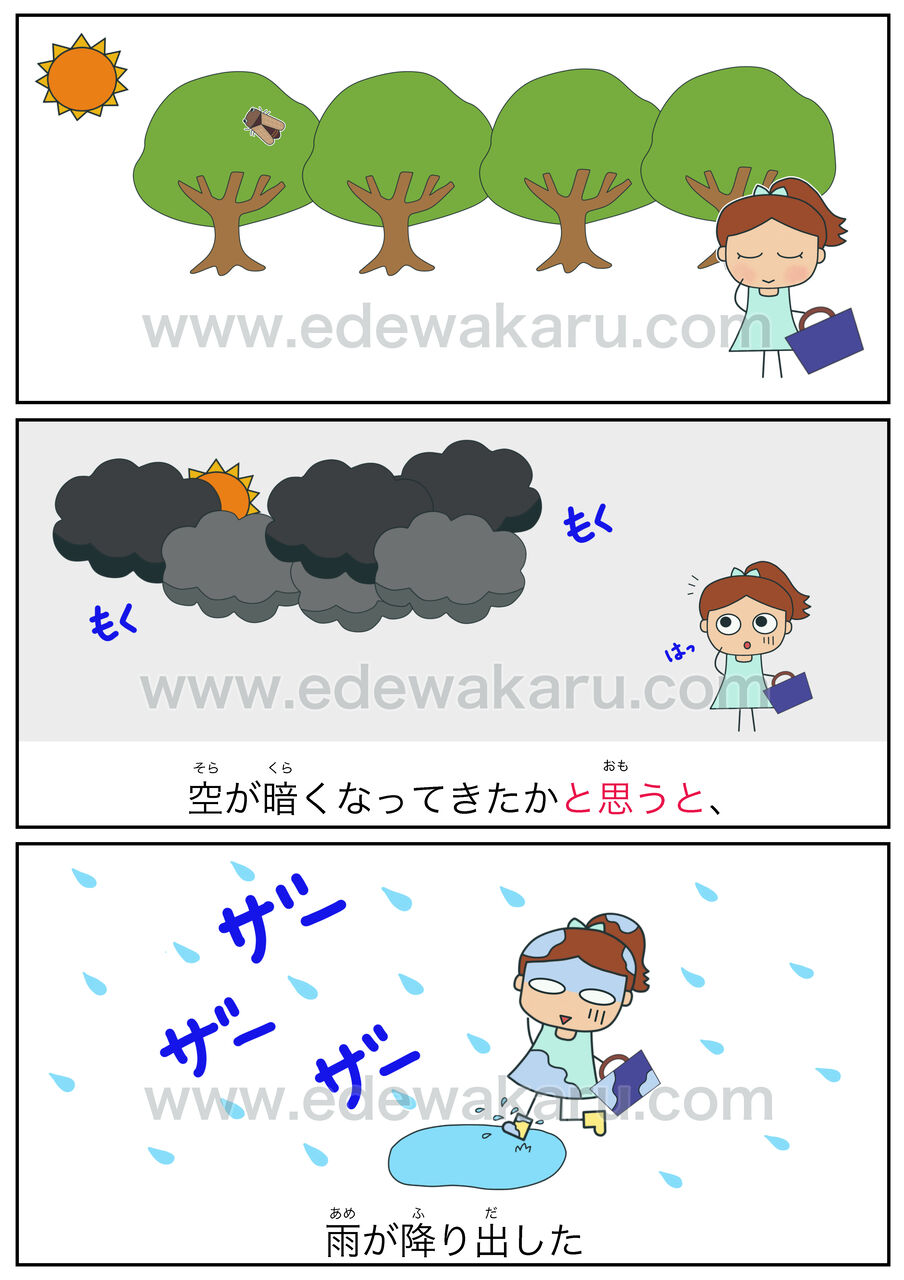



と思うと と思ったら 同時 日本語能力試験 Jlpt N2 絵でわかる日本語
宝くじが当たったと思いきや数字が1つ違った。 40度もあると言っていたので休むと思いきや、彼女は体を引きずりながら出勤してきた。 女の人だと思いきや髪が長い男の人だった。 電車に間に合ったと思いきや、目の前でドアが閉まった。 ② 電車の中では大声で話すべきではないと思います。 ③ 彼も明日の会議に出席するべきです。 ④ 「30代にしておくべきこと」という本を買いました。 ⑤ インフルエンザになったら、ほかの人のためにも会社を休むべきだと思います。Lately I've been checking out some translating and come across a lot of patterns like ~ればと思います For example, a company wasn't able to go through with an order and then at the end says something like 御一考頂ければと思います Or at the beginning 是非これから良いお付き合いを長くできればと思います



スペイン語教材 Complete Spanish Grammar
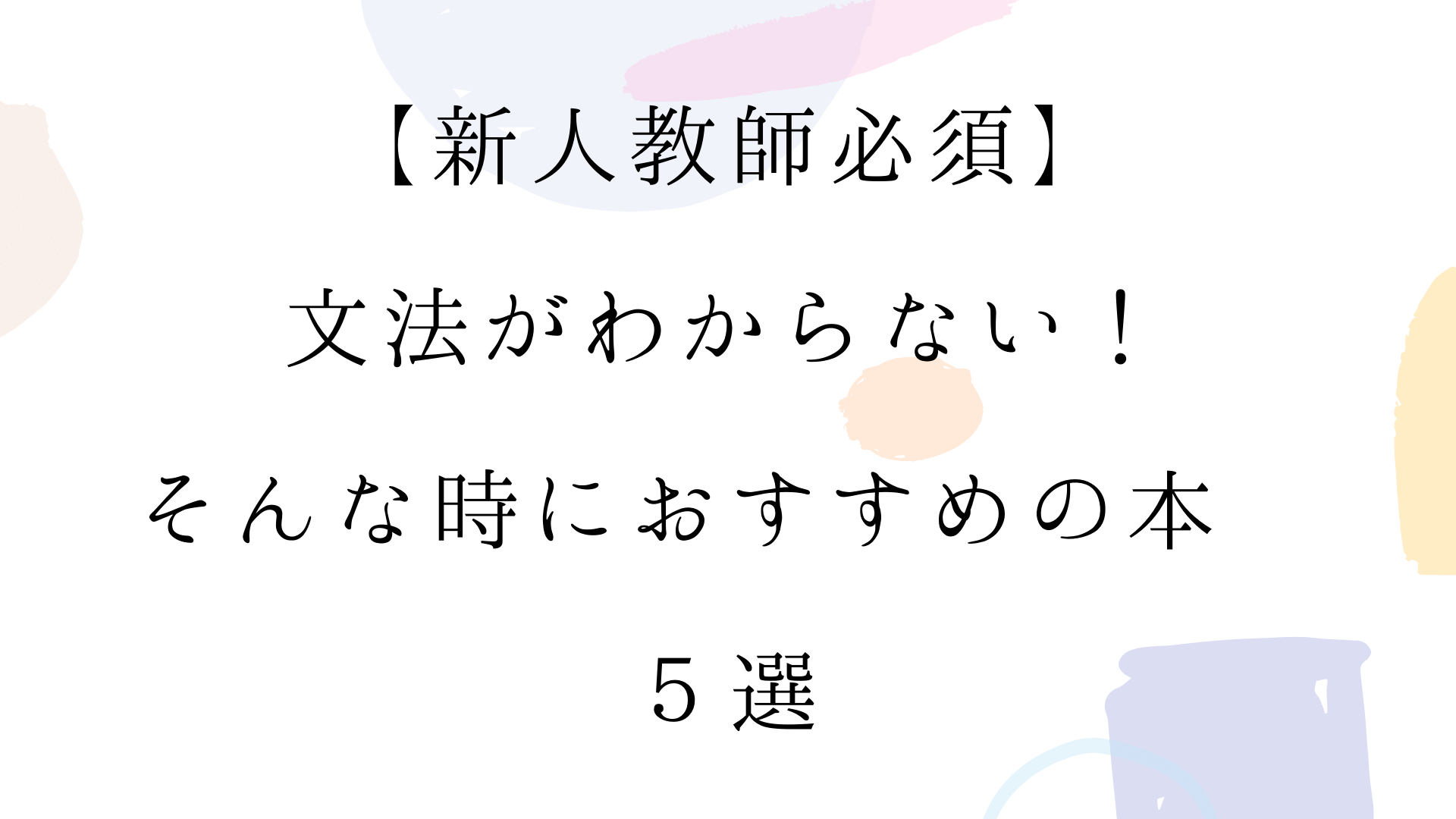



新人教師必須 文法がわからない そんな時におすすめの本 5選 オンライン日本語教師の教科書
Please LOG IN to use Favorites Wherever you see the green star, you can tag any kanji, word or grammar point for future reference in your Favorites list, which is accessible from the main menu You can automatically create flashcards from your Favorites, or use Quick Study to〜かと思います (〜 か と おもい ます), 〜だと思います (〜 だ と おもい ます) 〜かと思います の類義語 ~かと思います の方がとても丁寧な言い方です 店員がお客様に言うときによく聞きます ~だと思います は普通の言い方です3I thought, but the goal was invalid offside ③ I thought that the train had finally arrived




ようとおもう You To Omou Japanese Quizzes




Learn Jlpt N2 Grammar お 願う O Negau Japanesetest4you Com
Let's learn Japanese と思います/と思う grammar toomoimasu/ toomou Japanese と思います/と思う grammar toomoimasu/ toomou JLPT level N5 Formation Vる/た と思う Meaning and how to use Describe the meaning "think that/ consider that" Express the subjective opinion about something For example いadjective い Learn Japanese grammar 思いをする おもいをする (omoi o suru) Meaning to think; 文型:〜と思う 意見を述べたり、推測したことを述べる表現。 This is used to express the speaker's conjecture or used when saying an opinion




Pola Kalimat と思います To Omoimasu Aisuru Nihongo




Japanese Tests For You Japanese Grammar と思う To Omou
This is a selfstudy site by the Japan Foundation, "Marugoto Japanese Language and Culture (Elementary 1 )" Become the star of a drama and practice conversations, know about the lives of people in Japan and around the world You can practice grammar, kanji, and vocabulary too!JLPT N4のぶんぽう grammar ~と思います。 QUIZ1 これは と思います。 QUIZ2 明日は と思います。 Plain form+と思います。 I think (1) できると思います。 I think that I can do it (2) すごいと思います。 I think that it is amazingSupport Misa on Patreon ♡https//wwwpatreoncom/japaneseammoThis time we'll learn how to say "I'm planning to" / "I intend to" in JapaneseLearn the diffe




Learn Jlpt N2 Grammar かと思ったら かと思うと Ka To Omottara Ka To Omou To Japanesetest4you Com




Drill And Drill Jlpt N3 Grammar Omg Japan
Just add the particle が ga and the word すき suki (like) after the object that you like ねこ が すき です。 neko ga suki desuI like cats Note In Japanese, nouns do not change their form こう聞くと、ボリュームが多いように思いますがユニットごとに分かれているので英語の勉強計画を立てやすいと思います。 しかし、ポイントとしては必ず1から始める必要はないそうで青いEnglish Grammar In Useを利用する方はある程度の英文法知識がある方だ21 21 To Like—すき suki It is easy to like something and to say it!




The First Step For My Dreams アメリカンに憧れて




How To Say I Think In Japanese Giving Your Opinion Coto Japanese Academy
The review includes notes from today's Japanese gramTranslation for '思い' in the free JapaneseEnglish dictionary and many other English translations babla arrow_drop_down babla Online dictionaries, vocabulary, conjugation, grammar Toggle navigation share ★ In fact, in the case that the subject is not "I" you must use 〜と思っています (to omotteimasu) instead of 〜と思います (~to omoimasu) because it is expressing what another person (might be) thinking ★ The second point is that the clause before 〜と思います (~to omoimasu) must end in plain form




Learn Jlpt N4 Grammar てしまう Te Shimau Japanesetest4you Com




Learn Jlpt N4 Grammar てほしい Te Hoshii Japanesetest4you Com
と言います / と言いました report or quote speech Tweet 33 words My current mastery of this grammar point LOG IN to view grammar mastery data My mastery summary When using い 言Or so we thought; (1) あしたは早く起きようと思います。 2 意志を一定期間持ち続けている場合は、「と思っています」を使います。 (2) 夏休みに旅行しようと思っています。 (3) 木村さんは留学しようと思っています。 起きようと思います。 is just about right now




Essential Grammar And Conversation A Part Time Course Materials Coto Online Japanese
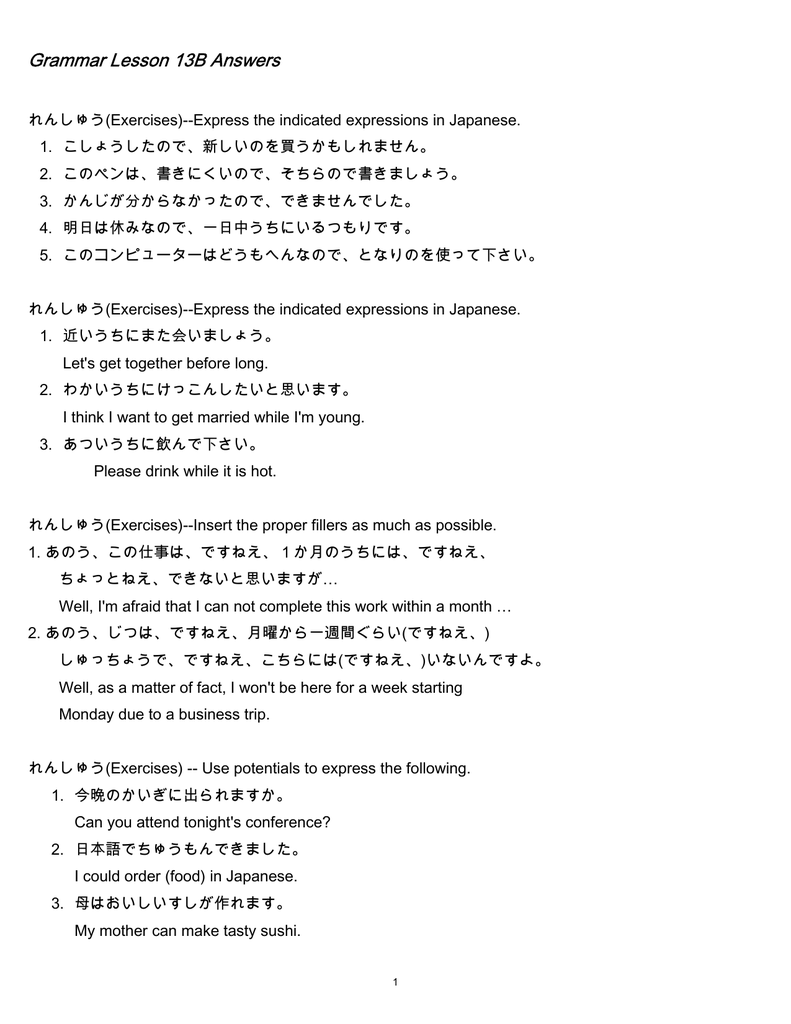



Grammar Lesson 13b Answers
これだけは覚えよう 1 意志形は単独で使うとひとりごとや勧誘の意味を表わします。 話し手がある行為をする意志があることを聞き手に伝える場合には、意志形に「と思います」(普通形「と思う」)をつけて使うのがふつうです。 (1)あしたは早く起きようと思います。 2 意志を一定期間持ち続けている場合は、「と思っています」を使います。 (2)夏休みに旅行




から言うと Kara Iu To Jlpt N3 Grammar List




N5 Japanese Grammar と思います I Think Lesson98 日本語 Jlptn5 Youtube



英語の文法で過去完了形がややこしすぎます わかりやすく教えていただけませんか Quora




Jlpt N5 Grammar と思います To Omoimasu




Jlpt N5 Grammar すぎる Sugiru Meaning Jlptsensei Com




How To Use To Omoimasu In Japanese Naturally All Forms




Jlpt N5 Grammar と思います To Omoimasu
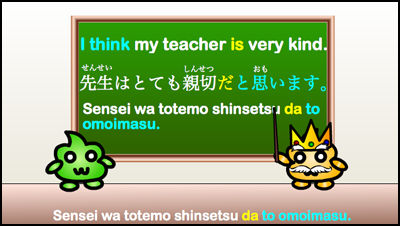



Grammar How To Say I Think In Japanese Punipunijapan
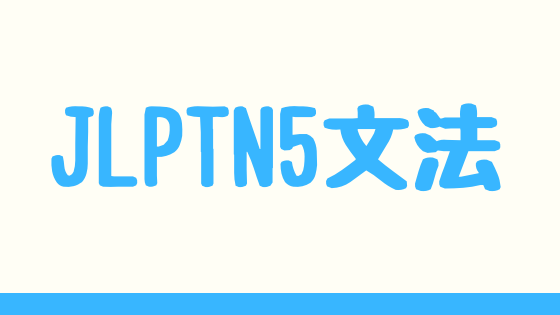



N5文法 たぶん きっと 普通形 と思います 推量 意見 感想 ちよさんぽ




Dekiru Nihongo Beginner Intermediate My Grammar Note Watashi No Bunp Omg Japan




それにしても Sore Ni Shite Mo Japanese Quizzes



What Is The Difference Between 思います 考えます Quora




My Chinese Classroom Vol 2 Mp3 2nd Edition Learning Chinese Textbook For Elementary Mandarin Learners Education Teaching Aliexpress




ことだから Koto Dakara Japanese Quizzes




Grammar Review 21 To Omoimasu To Iimashita Hai Ganbarimasu
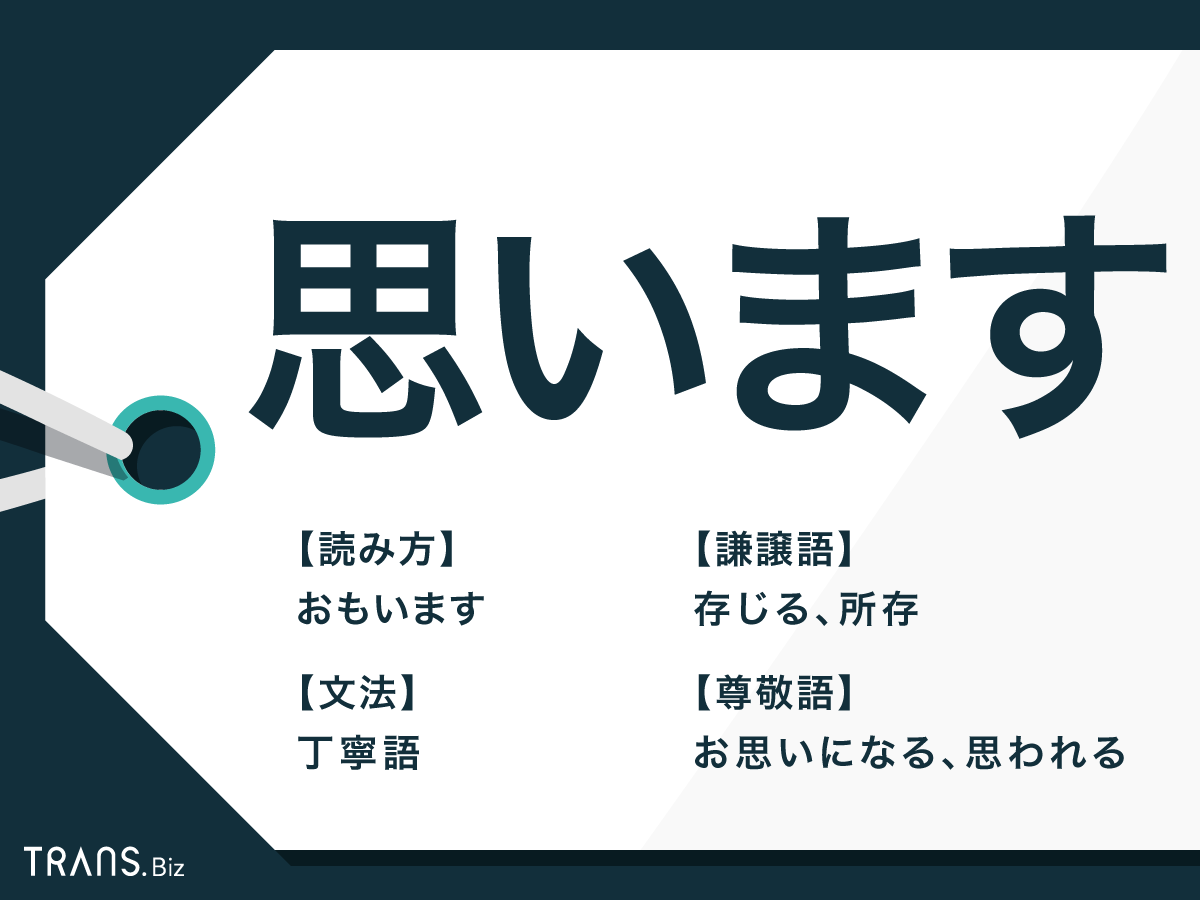



ビジネスで 思います はng 思う の敬語表現と英語表現 Trans Biz




Jlpt N4 Grammar と思う To Omou Meaning Jlptsensei Com




Jlpt N2 Grammar 上 Jou Meaning Jlptsensei Com




Japanese Grammar と思います To Omoimasu I Think That How To Express Your Opinion 日本語まとめサイト




日本語初級の教案とイラスト と思います 推測 意見 みん日第21課




Essentialj Apanese Grammar By Phuongpham Issuu




しようと思う を韓国語で言うと 意思を表す言い方 려고 をマスターしよう ちびかにの韓ブロ




Jlpt N4 7 文法 ぶんぽう Grammar Mlc Japanese Language School In Tokyo




Meaning Of 4歳と14歳で 生きようと思った Japanese Language Stack Exchange




Grammar How To Say I Think In Japanese Punipunijapan




と思います I Think の Structure Japanese Language Japanese Language School Japanese Language Learning
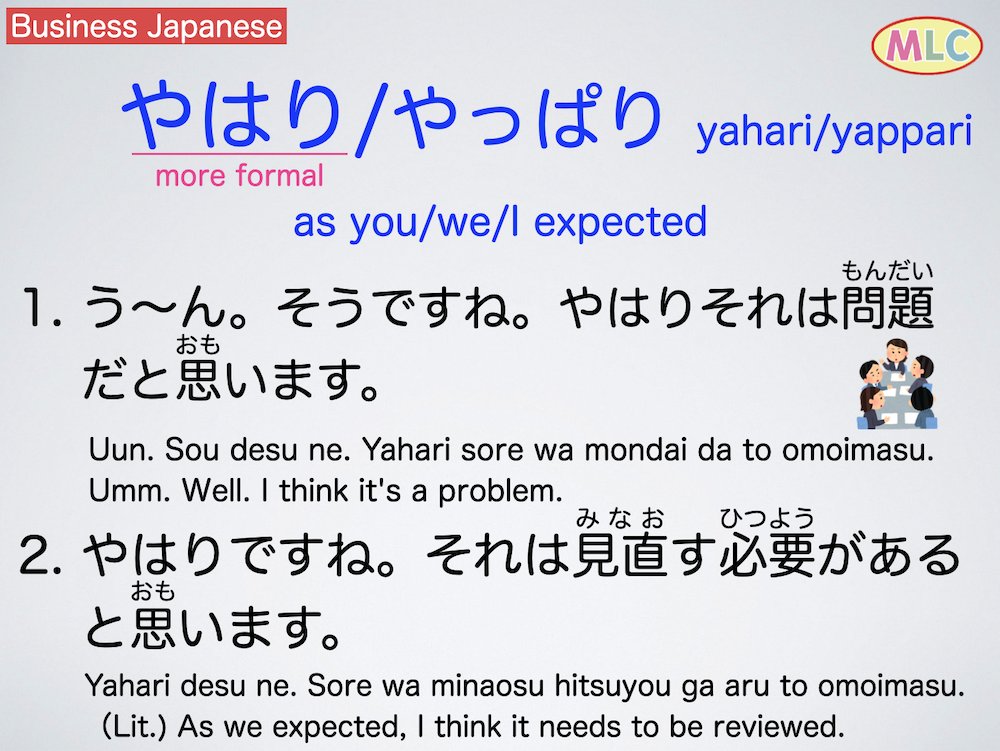



Mlc Japanese School Business Japanese Example Sentences Learn Japanese Learnjapanese Language Japaneselanguage Lesson Vocabulary Japan Grammar Nihongo にほんご 日本語 日本語勉強 Jlpt Businessjapanse ビジネス日本語
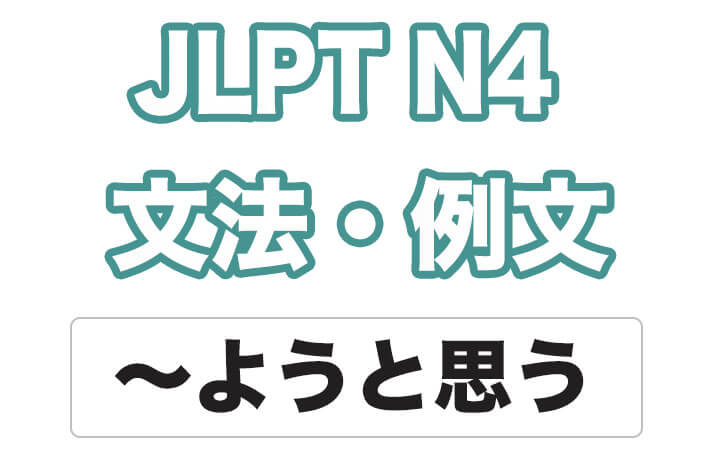



Jlpt N4 文法 例文 ようと思う 日本語net
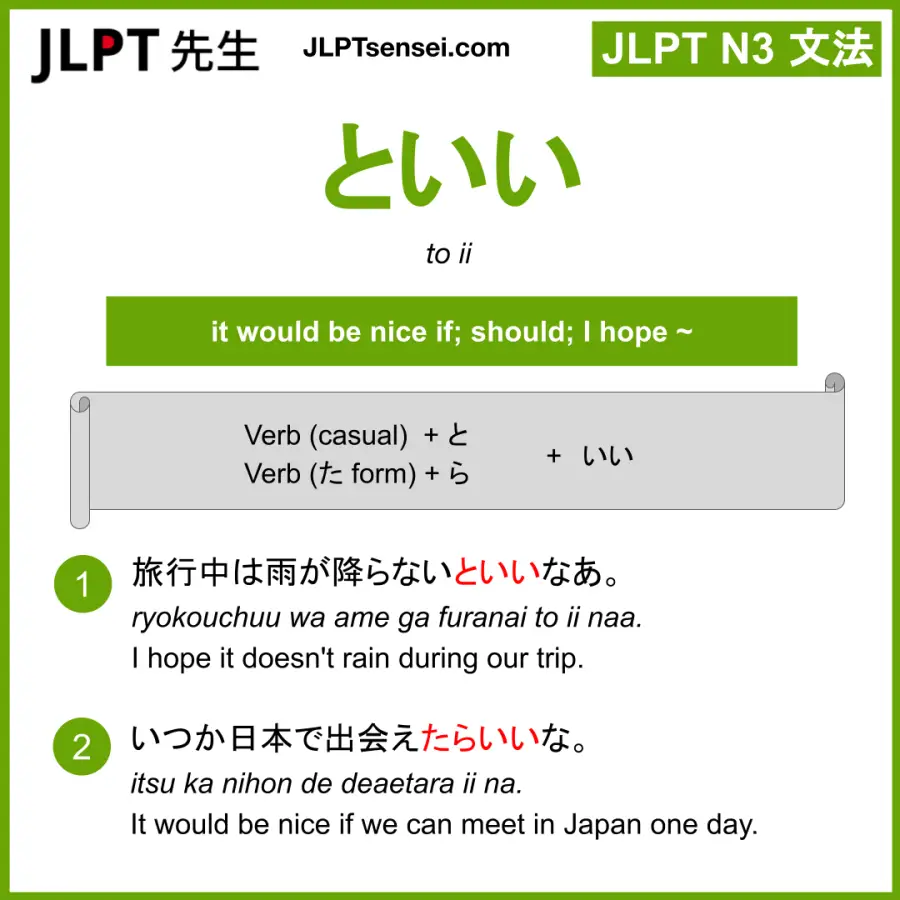



Jlpt N3 Grammar といい たらいい To Ii Tara Ii Meaning Jlptsensei Com




Nihongo Eな Portal For Learning Japanese




Jlpt N5文法 と思います Japanese Grammar 日本語を勉強しましょう Youtube
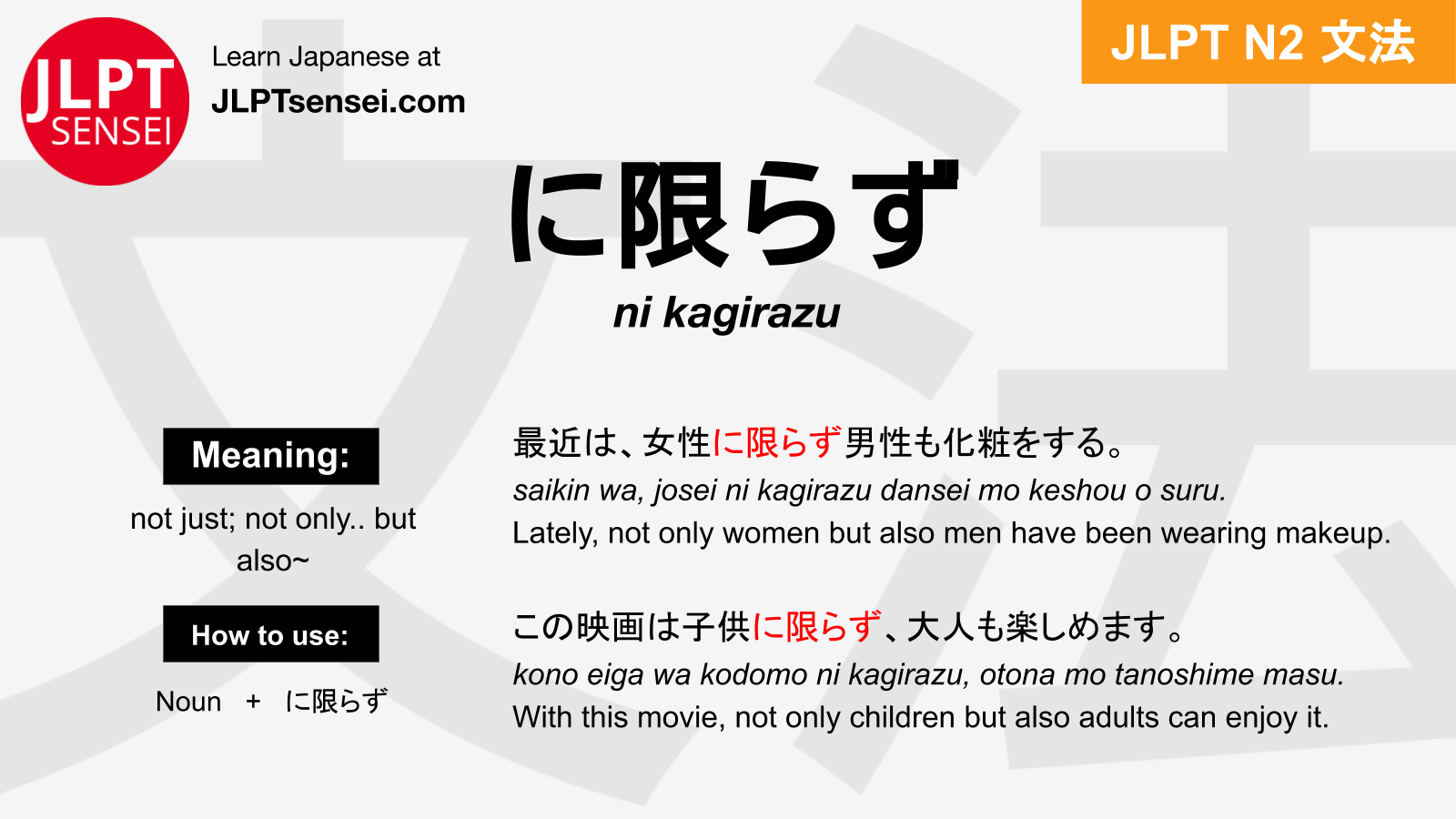



Jlpt N2 Grammar に限らず Ni Kagirazu Meaning Jlptsensei Com




お忙しいかとは思いますが の正しい使い方と敬語の文法について ピンスポ ドットコム




意向形 Grammatika
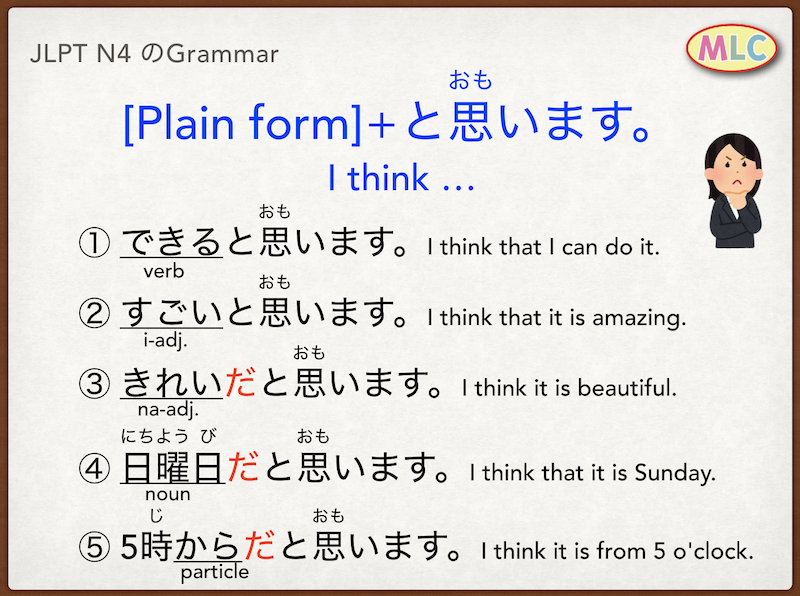



Jlpt N4のぶんぽう Grammar と思います Mlc Japanese Language School In Tokyo
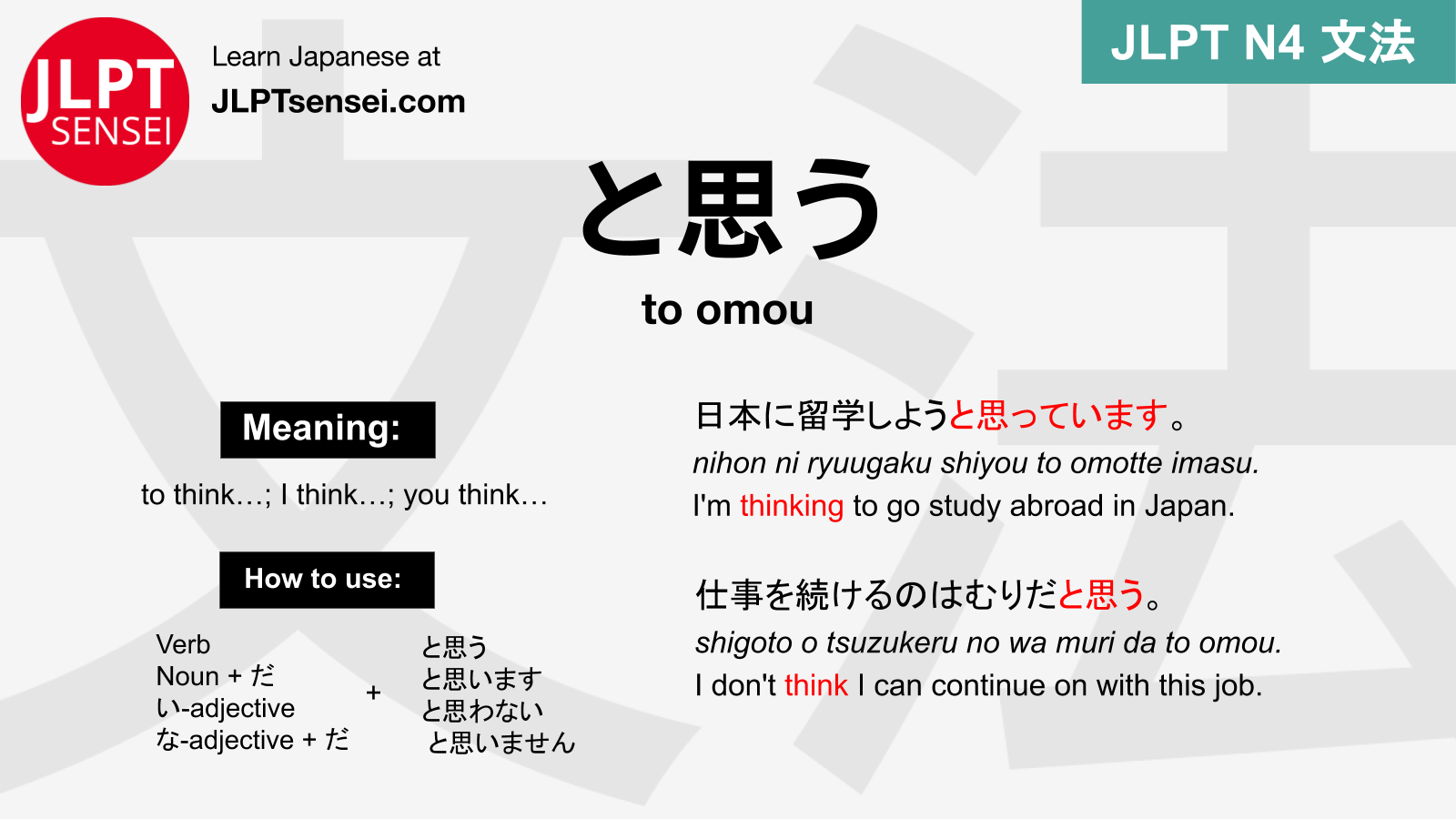



Jlpt N4 Grammar と思う To Omou Meaning Jlptsensei Com








日本語を学ぼう Grammar Lesson21 わたしは それは 嘘 うそ だと 思います I Think It S A Lie Youtube




日本語を勉強しましょう Let S Learn Japanese Posts Facebook



Japanese 文法 と思います 解説
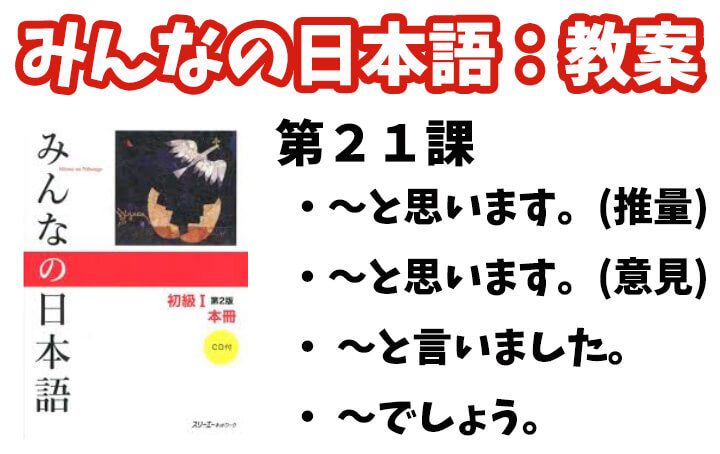



教案 みんなの日本語初級1 第21課 日本語net




Japanese Grammar How To Say I Think In Japanese Using と思います Youtube




Learn To Think In Japanese With と思います と思っています Very Imp Daily Grammar Youtube




Japanese Grammar How To Say I Think In Japanese Using と思います Youtube




Jlpt N4 Grammar ではないか Dewa Nai Ka Meaning Jlptsensei Com




と思うと と思ったら 変化 日本語能力試験 Jlpt N2 絵でわかる日本語




New Kanzen Master Jlpt N4 Grammar Omg Japan




おはようございます N4 Level Amico Japanese Language School Facebook




Jlpt N4 Grammar 始める Hajimeru Meaning Jlptsensei Com




Jlpt N4 Grammar Guide Coto Online Japanese
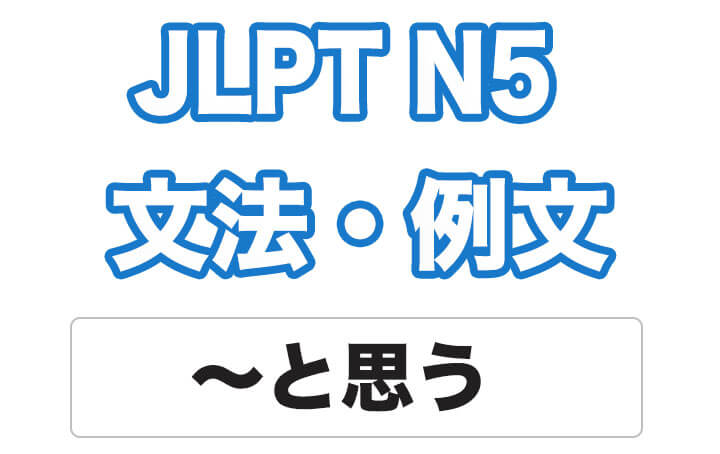



Jlpt N5 文法 例文 と思う 日本語net




ば なら れんしゅう Worksheet




Amazon Com Contemporary Japanese Textbook Volume 2 An Introductory Language Course Includes Online Audio Sato Eriko Books




ようと思う 日本語能力試験 Jlpt N4文法 絵でわかる日本語
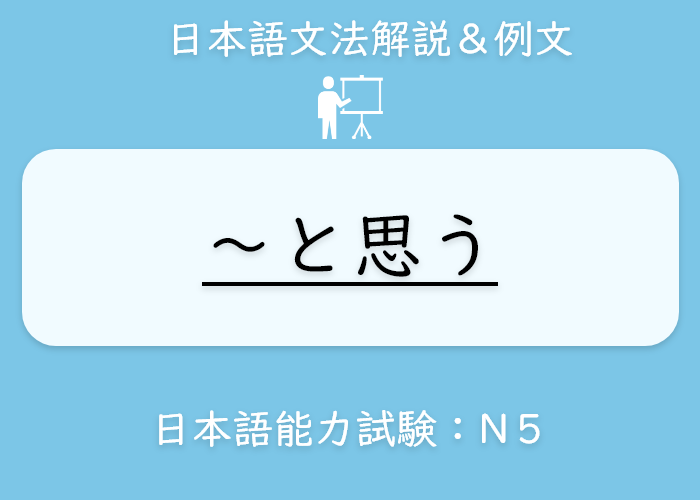



イラスト 英語 と思う の文法説明 Langoal
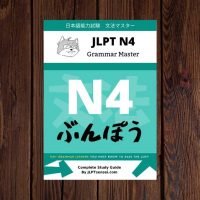



Jlpt N4 Grammar ようと思う You To Omou Meaning Jlptsensei Com
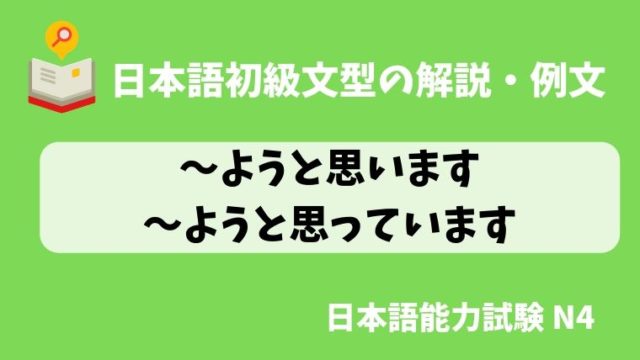



日本語の文法 例文 ようと思う ようと思っています 日本の言葉と文化




Japanese Grammar と思います To Omoimasu I Think That How To Express Your Opinion 日本語まとめサイト
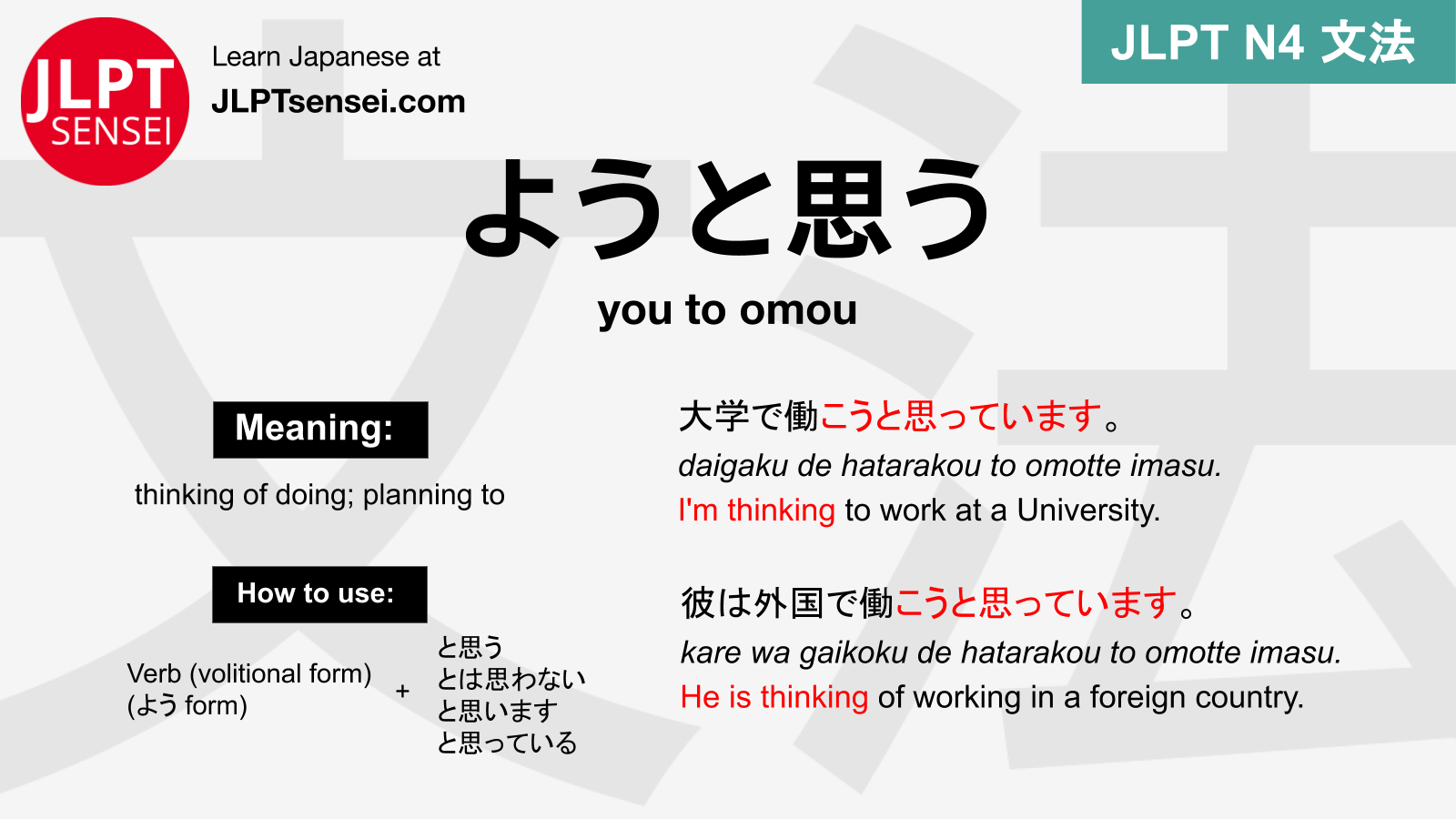



Jlpt N4 Grammar ようと思う You To Omou Meaning Jlptsensei Com




n4文法 と思います Youtube



高知インター店 日英対照 文法と語彙への統合的アプローチ 生成文法 認知言語学と日本語学 新品本物 Atempletonphoto Com




Learn Jlpt N1 Grammar と思いきや To Omoikiya Japanesetest4you Com




Japanese For Beginners Hou Ga Ii 方がいい ほうがいい




Amazon Com Contemporary Japanese Textbook Volume 2 An Introductory Language Course Includes Online Audio Sato Eriko Books




Jlpt N4 文法 例文 ようと思う 日本語net




Jlpt N5文法 第回 ふつうたい と思います Learn Japanese Jlpt N5 Grammar Lesson Youtube
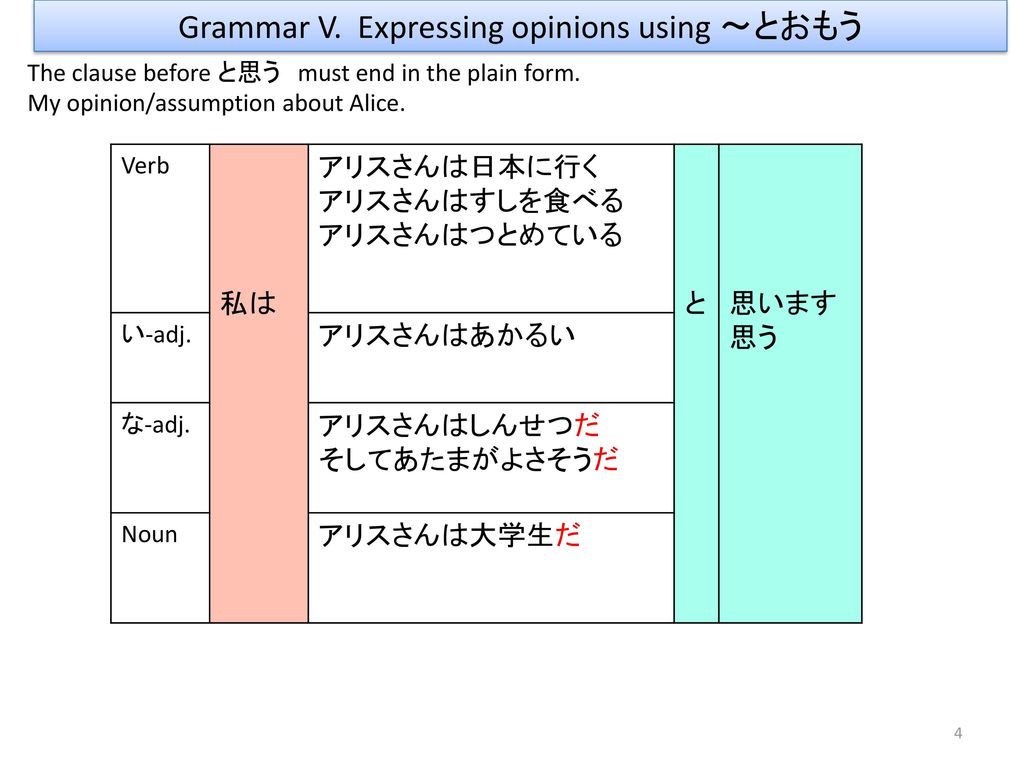



Nakama1b L10 G5 とおもう Ppt Download




Jlpt N3 文法 ぶんぽう Grammar Japanese Language Mlc Facebook
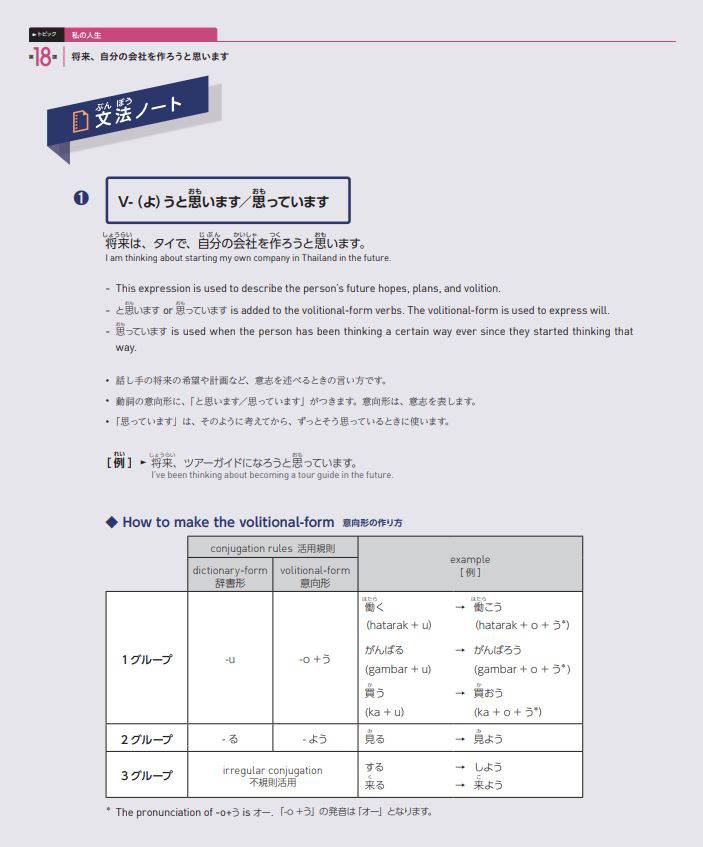



The Japan Foundation Nihongo Kyoiku Tsushin Free New Teaching Materials Irodori Japanese For Life In Japan




When To Use か とか And や How To Say Or And Such Things In Japanese




Learn Jlpt N4 Grammar ておく Teoku Japanesetest4you Com
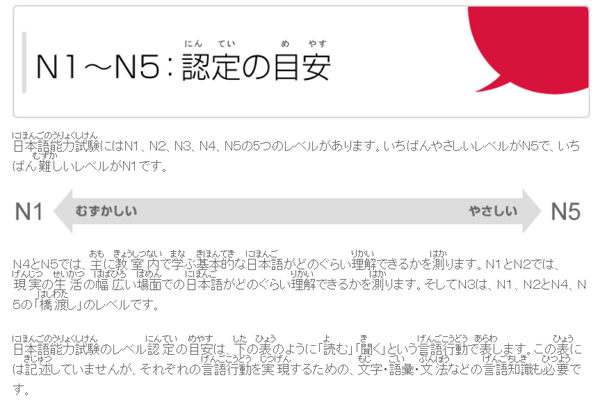



日语课堂丨お馴染みのn5 N1 大家熟悉的n5 N1其依据和由来是 知乎




21課 教案 と思います と言います でしょう 日本語教師のn1et




Learn To Think In Japanese With と思います と思っています Very Imp Daily Grammar Youtube
コメント
コメントを投稿